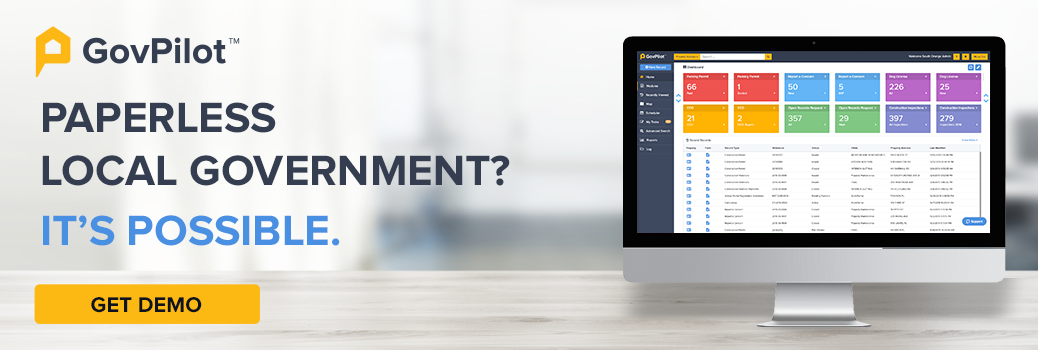When it comes to keeping your community safe and functional, local law enforcement plays an integral role. From directing traffic during a power outage to responding to emergency situations, the local police handle it all.
Yet many local law enforcement departments are using antiquated technology and processes for managing their day to day operations. And with the heavy load of paperwork every law enforcement department is accustomed to, if you’re still using paper based workflows, you’re missing out on a serious opportunity to digitize filing and record storage.
Read on to learn more about modernizing your local law enforcement department to your entire community’s benefit.
What is Local Law Enforcement Software?
Law enforcement software is designed to modernize local police department workflows with automated and cloud-based government technology.
From filing and storing paperwork to looking up property records, and processing OPRA / FOIA requests, law enforcement technology streamlines processes to make officers’ and administrative officials’ workflows easier and substantially more efficient.
What are the Benefits of Law Enforcement Software?
Law enforcement software uses technology known as robotic process automation to manage and automate tedious administrative workflows. The benefits include:
1. Paperless Workflows
Far too many local officers spend the bulk of their time filling out paperwork by hand and filing the documentation (or leaving it in a pile on their desk!) Online forms can be completed substantially more quickly, and will be made automatically accessible to all relevant government officials via the cloud.
Accept and process Freedom of Information Act (FOIA) requests quickly and efficiently with end-to-end digital forms and automated workflows. With digital processes you'll be able to do in seconds what used to take hours or days!
Learn more about the Benefits of Paperless Government in our blog.
2. GIS Mapping Technology
GIS maps provide a 3D overview of your community and its various residential and commercial spaces. Responding to a domestic abuse call? Click on the property at hand on your GIS map for a full overview of previous violations and notable takeaways from previous visits. Responding to an emergency? The endangered area can be marked on the GIS map for law enforcement officials to have a clear idea on the exact location, details on the issues, and warnings on potential hazards.
Learn more in the guide to GIS Mapping Benefits for Local Governments
3. Scheduling of Assignments to Officers
From responding to 911 calls to enforcing local ordinances to managing road closures and traffic, there’s a seemingly never-ending list of to-dos for your law enforcement officers to handle. Luckily, when a new assignment rolls-in, scheduling of the task to an officer can happen automatically and notify an officer. No longer will assignments need to occur manually, as law enforcement software will timestamp and assign the task to make sure it’s completed quickly and efficiently.
4. Automation
Government tech can automate many of the time consuming, mundane administrative processes law enforcement officials deal with on the day to day. Forms filed online will automatically be stored in the GovCloud and made available to all relevant government officials, including representatives from your county or municipal court house.
Automatic timestamps alongside officer assignments will show leadership who’s doing what and hold officials accountable to complete the task at hand. Learn more about How To Improve Local Government Accountability.
5. Cybersecurity / Data Backup
If your local police department is still using paper workflows or on site computer systems, you’re one government data breach or natural disaster away from permanently losing your critical data.
The cloud is considered the most effective data storage method for law enforcement (and local government departments in general) since it’s more challenging to hack than in-house servers and automatically backs data up daily, meaning even if you do experience a ransomware attack, you won’t have to fear permanent data loss.
Learn more about Local Government Cybersecurity and Why the Cloud is Better for Governments Than In-House Servers.
6. Report a Concern Notifications
Law enforcement’s job is substantially easier and more efficient with community support. With a simple complaint management system, community-members can report non-emergency concerns - such as a malfunctioning traffic signal - to your law enforcement officials directly from a cell phone app. Once a complaint is filed, automated scheduling will ensure a law enforcement official (or other relevant department) addresses the issue.
Improve local civic engagement and manage citizen complaints with ease with your new law enforcement tech.
7. Intuitive Reports and Dashboards
Modern cloud-based law enforcement software pulls real-time data into informative and easy to understand reports and dashboards. Trying to identify criminal patterns in a particular neighborhood? Crime data can be pulled into an intuitive criminal report. Looking for clear cut financial data based on issuance of fines and tickets? Fees and fines will be automatically pulled into a financial dashboard.
8. Online Fee and Fine Processing
Your law enforcement department handles issuing speeding tickets, fines for code violations, and in many cases parking tickets. With GovPilot, you have a variety of credit card processing integration partners to choose from so that people can pay their fines directly from your website. Save everyone time by not making guilty parties drive to city hall to make fine payments. Learn more about How to Modernize Your Local Government Fee & Fine Collection.
9. Police Record Management - FOIA & OPRA
With the ever growing pile of paperwork in your law enforcement department, finding a police report from months or even years ago can be quite the hassle if you’re still using a traditional filing cabinet. With the cloud, law enforcement officials, municipal administrators, and court house officials can find any document in just a few clicks.
This makes responding to Freedom of Information Act (FOIA) and Open Public Records Act (OPRA) submissions much faster and easier than ever before, saving staff hours worth of time every week that they can dedicate to more important initiatives.
10. Asset Management
Every law enforcement department has various physical assets that it needs to acquire and maintain. For management of assets like vehicles, radios, tools, etc. government software can automatically track the status of current assets and their quality, as well as offer visible insight into asset repair and maintenance projects from public and private-sector partners.
11. Voluntary Emergency Contact Reporting
Many local law enforcement departments are modernizing their workflows as it pertains to special needs members of the community. GovPilot takes pride in offering a special needs module for local government websites which makes it possible for loved ones to file information for special needs family members with autism, dementia, bi-polar disorder, and beyond so that officers know how to respond appropriately given their condition.
How to Switch to Law Enforcement Software?
Hopefully, the previous section convinced you that making the switch to the cloud offers many clear benefits for your law enforcement staff. Yet, you may be hesitant to make a switch because you’re nervous about the transition.
Luckily, it’s easier than you think. Here’s how you can make the switch to the cloud effectively and with department approval
1. Communicate with the Whole Department
Officers that have worked in your municipality for decades may be accustomed to the status quo. Yet, once they come to recognize how many manual, repetitive administrative workflows can be automated with government tech and online forms, they’ll come to love it. Keep your department in the loop on your plan for going digital by having open conversations with clear timelines. Be sure to reiterate the benefits of law enforcement software to build departmental support.
Learn more in the guide to Local Government Communications Strategies.
2. Upload Existing Records to the Cloud
When you select GovPilot as your government technology partner, a team of experienced onboarding specialists will start uploading your existing records to the cloud, so you’ll have ALL of your historical documents accessible within a few clicks from your database.
3. Get the Staff Onboarded with Helpful Training
Onboarding specialists will take the time to educate your department on the best practices for utilizing the software. Government officials have reported feeling comfortable with the technology in just a day, and typically are fully onboarded within six weeks.
You’ll also be trained on cybersecurity protocols to ensure your department doesn’t get breached from a phishing scam or other hacking technique. Learn more in our guide to Training Local Government Officials on Cybersecurity.
The Best Local Law Enforcement Software
When it comes to public safety, your local law enforcement plays the most integral role in your community. Let government software automate time consuming, repetitive tasks with simple online forms so that police can spend more time on more important endeavors. Schedule law enforcement duties automatically to get work done and hold officials accountable. Let constituents inform law enforcement of communal issues via a complaint management app. And pull all of the data collected into intuitive dashboards and reports for future decision making.
To learn more about how GovPilot can transform your law enforcement department, book a free demo.
Law Enforcement Technology FAQs
What is Law Enforcement Software?
Law enforcement software is technology meant to improve on existing law enforcement workflows by automating mundane administrative tasks, moving departmental forms to an online format, and storing records in the cloud. The technology is meant to save department officials time and money via automation and easily accessible digital records.
What is a Law Enforcement Database?
A law enforcement database is the storage of critical police department data that government officials within your municipal or county government require access to. While many local governments continue to use in-house servers or even paper filing for storing critical law enforcement data, the cloud is considered the modern law enforcement database with regular data backup and automatic access of law enforcement records to relevant government officials across your locality.
How Is Law Enforcement Analytics Helpful?
In moving to the government cloud for your law enforcement technology, real time data will be collected and added to various intuitive dashboard and reports for law enforcement leadership (and municipal leaders in general) to utilize to look for trends in things like:
- Law enforcement department budget allocation
- Law enforcement asset management (police cars, tools, etc.)
- Fee and fine revenue generation
- Crime trends (regional and crime-types)
- Public perception / approval rating
Why Are Online Forms Helpful for Police Departments?
By going digital, law enforcement officials can fill out their daily paperwork and reports straight from their cell phone or computer. Once filed, the documentation is automatically stored in the cloud, and made accessible across government departments to the relevant officials. Time and energy is saved with quicker form filing and automatic accessibility to court officials, local leadership, all relevant law enforcement officials, and beyond.
Read On:










